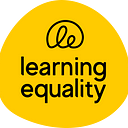Positioning Kolibri to fly to new heights in Uganda through collaboration with refugees

The early hours of day 1 were mostly showery, but in the afternoon, the rain let down briefly, so we all braved the drizzle and moved to the Kololo SS computer lab, where we conducted our practice sessions. It was the beginning of our first training of trainers in June 2019 with SESEMAT national trainers and staff from organizations supporting the implementation of Kolibri in Uganda as part of a new collaboration involving Learning Equality along with Education Cannot Wait, HP, UNHCR, UNICEF Uganda, Global Business Coalition for Education, and local education and learning partners. Several initiatives will be rolled out in the next 6 months to test approaches to overcome some of the challenges identified in the pilot to help create robust and scalable models.
Setting the groundwork for these collaborations was a successful pilot of the “Transforming Computer Labs to Learning Labs” initiative, led by UNICEF Uganda and the Ministry of Education and Sports (MoES) in 2017/2018. An external evaluation presented to NCDC and UNICEF Uganda revealed that Kolibri has the potential to improve learning outcomes, promote resilience for education and provide information necessary for life-skills. The promising results positioned the potential for Kolibri to be sustainably integrated in Uganda. In early May 2019, findings of the evaluation was presented to the MoES Planning, Monitoring and Evaluation Working Group. The WG chair welcomed the initiative which aligns well with plans to create a dedicated e-learning department within the ministry. He advised that continued efforts should work to sustain the outcomes and attempt to address constraints among which include inadequate number of computers and limited teacher capacity for digital literacy skills. Next, the evaluation findings and prayer for expansion will be presented to the Education Sector Consultative Committee.
Uniqueness of this collaboration
This new expanded collaboration is unique in that it will test models around partnership, hardware deployment and training for using Kolibri in refugee and host community contexts.
Context: We are working with 19 secondary schools from 3 refugee hosting districts: Adjumani, Moyo and Kampala.
Hardware: The HP School Cloud hardware, a response to existing hardware challenges in-country, with Kolibri software will be deployed in 15 government-aided (refugee hosting) secondary schools through an initial in-kind donation from HP. Three schools with existing hardware, supported through an additional collaboration between Learning Equality, UNHCR and Google.org, will receive training and support and all 19 schools will be assessed for required furnishing to help them set up a lab ideal for use.
Partnership: For this project, we sought collaborators who saw this initiative fitting within their broader education objectives and existing structures. Through UNHCR, we are delighted to be collaborating with Finn Church Aid (FCA), InterAid Uganda (IAU) and Jesuit Refugee Services (JRS) for implementation. These organizations have ongoing education programs in the selected schools so they will be able to mentor teachers and students, gather user feedback, track platform use by teachers, and monitor growth in student knowledge, competencies, STEM and life skills. As far as teacher training, there is the opportunity to immediately capacitate in-service teachers on Kolibri. Teachers from the Secondary Science and Mathematics Teachers (SESEMAT) programme, initiated by the MoES to enhance the quality of Math and Science teaching and learning in secondary schools, will integrate Kolibri and ICT pedagogy into its current training framework and, in a cascade approach, roll out trainings through its National and Regional levels. In turn, SESEMAT will lead trainings with champion teachers and all teachers in selected schools.
About our first Training of Trainers (ToT)
We recently concluded the first training of trainers with SESEMAT national trainers and staff of the implementing organizations on June 10–11, 2019 at Kololo Secondary School in Kampala. In total, 16 participants attended the training. Kolibri was praised by participants for being user friendly, intuitive and with ability to organize content. In comparison to similar learning platforms used before, Kolibri was highly commended for its Coach tools, which enables learner assessment and monitoring in real time.
“Kolibri is a vital supplement for current teaching practices and it is designed for the last mile” — Caroline Taliba, National Trainer, SESEMAT
We experienced some technical outages from the n-Computing system, but worked around them by having participants take turns on some of the computers that were stable. For our next training, we will scope additional venue options for computers with better performance. That said, given all the performance issues the School Cloud is designed to address, we cannot wait to have it in schools. The current timeline to have the 19 schools equipped with the School Cloud, laptops and a host of computer accessories is August — September 2019.
#KolibriFlies with teachers in Uganda
On our journey to support the adoption and use of Kolibri, the following activities geared up from July to September are:
- technical training in Kolibri for partner schools and ICT leads by Sybyl
- training in Kolibri and ICT pedagogy for SESEMAT regional trainers, champion teachers and selected schools
- sensitization meetings with stakeholders beginning with school heads and representatives of the school Board of Governors (BOG)
All in all, we know the platform and tools have benefited from the honest feedback of ongoing implementations globally. As we work to see how Kolibri can be used to benefit an existing government-supported teacher, we are enthusiastic to pull all the stops to support implementations, capture lessons learned and identify which models work best in refugee and host community contexts.

